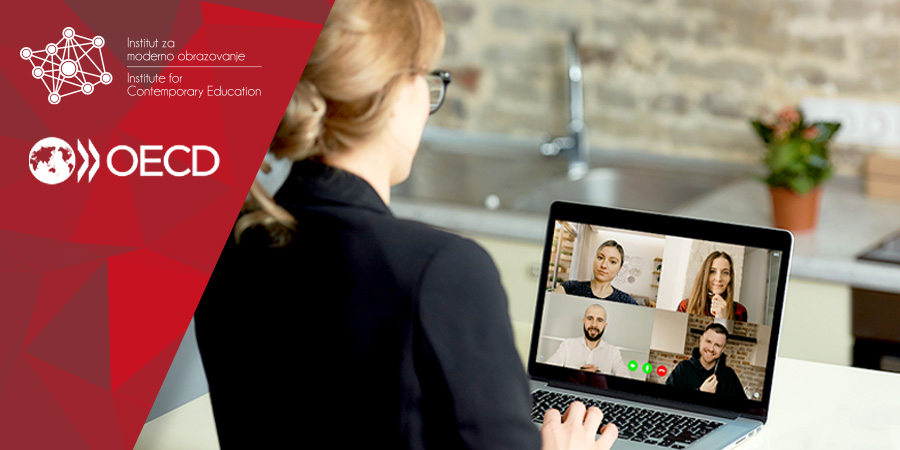
OECD conference: Digital education for a strong recovery
An international conference, “Digital education for a strong recovery: A forward look”, organised by the OECD Centre for Educational Research and Innovation (CERI) from 8 to 10 June 2021, tackles one of the most important post-Covid issues – how to ensure strong recovery through digital education. Our Institute for Contemporary Education strives to bring the best of digitalisation and has earned a seat at the conference, along with the best educators, educational scientists and policymakers in the world.
Challenges and opportunities
Our societies are transforming and education, both formal and non-formal, plays a crucial role in helping people embrace the changes, which have been accelerating in the post-Covid period. Countries now face a challenge to respond to the digitalisation process not only in terms of infrastructure, which surely needs to be reconsidered but also in managing teachers’ digital pedagogies, which have to be reinvented.
With this in mind, the conference brought together the educationalists who highlighted advances in educational technology based on artificial intelligence (AI), robotics and blockchain. The future of education is changing the perspective of policymakers, education stakeholders, the global education industry and experts in the field, who have started thinking of related policy issues, international opportunities for collaboration, and strategies about embracing and driving the digital transformation in education.
Institute for Contemporary Education at the forefront of digital education
The growing credibility of the Institute for Contemporary Education in the international community paved the way for a participatory role in the global movement towards digital education. Our Academic Director, Dr Svetlana Belic Malinic, who is an international expert in education, has been invited to the conference in order to support the emerging innovative practices. On the first day of the conference, she was in the working group Interactive “Future Education Scenarios (schooling)”, which explored the transformational drivers and the impact they make on digital education, creating new scenarios for school education. Sharing insight with colleagues from all around the world and brainstorming ideas for further developmental objectives has been both rewarding and challenging.
On the second and third day, the conference offered sessions on four strands
- General strand with key decision-makers: sessions with Ministers, leaders of international organisations and other education stakeholders
- Expert strand on the frontiers of education
- Policy strand on countries’ digital strategies
- Futures strand with education technology industry and two closed workshops
Svetlana participated in the sessions on the frontiers of education. One of the sessions she attended was “Building a framework for research on digital education worldwide”, which explored how the application of new technologies for teaching and learning has far outstripped our evidence-based knowledge of how digital innovations and methodologies enable learning, why and for whom. Yet another interesting session was “Robots in Education: where are we at?”, which showcased the benefits that social robots offer to education, particularly in the light of their real-world interactions with learners and enhanced learning outcomes.
Digital assessment has been in focus recently. One of the sessions, “Towards a new generation of assessment”, showed the strong potential of educational games as supplements for traditional tests in order to improve the quality of education. Last but not least, Svetlana attended sessions “Blockchain and the new credential ecosystem” and “AI in society: Interdisciplinary perspectives from the OECD”, where the focus shifted to the future aspirations and innovations that would change the governance of educational institutions.
Innovation thought digitalisation
As the participants of the conference concluded, innovation in education steams through digitalisation. On our way to a strong recovery, we decidedly need to embrace the changes, unlearn and relearn our pedagogies and help both students and teachers upskill and reskill to be able to scale up new approaches.
Our Institute for Contemporary Education strives to build the capacities of our teachers by scheming up courses, which are interdisciplinary, interactive and, above all, interesting. We are positive that the OECD policies will be disseminated throughout Europe and that the Institute will be ready to live up to this challenge and further advance effective and equitable digitalisation in education.


 Srpski
Srpski




